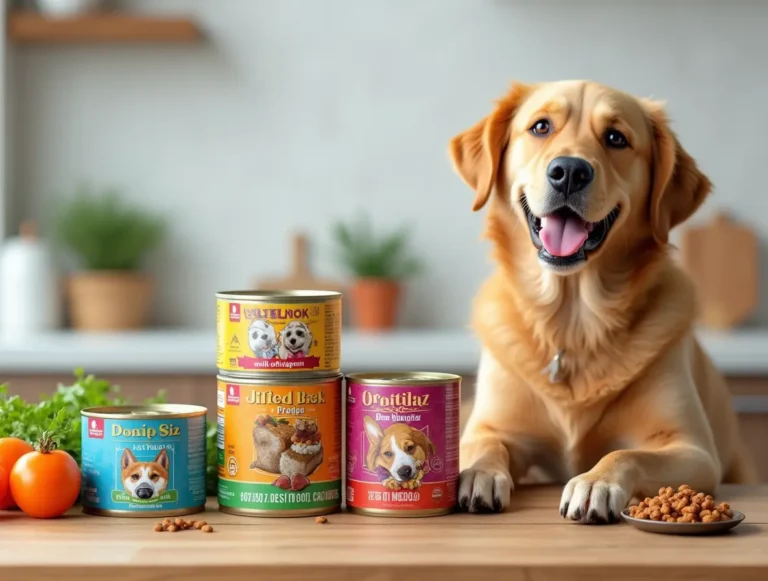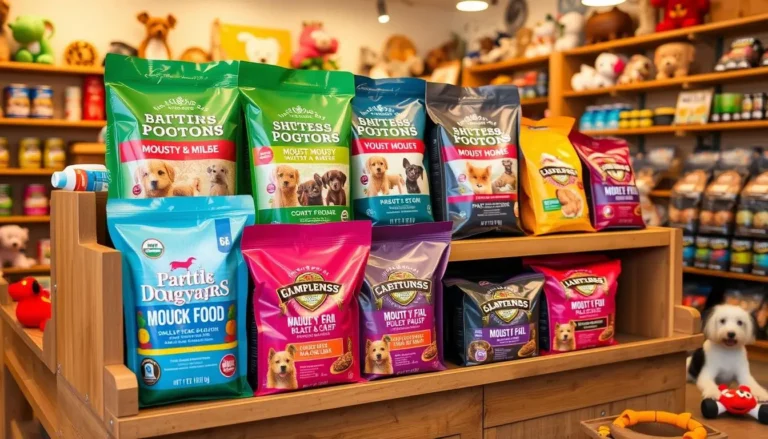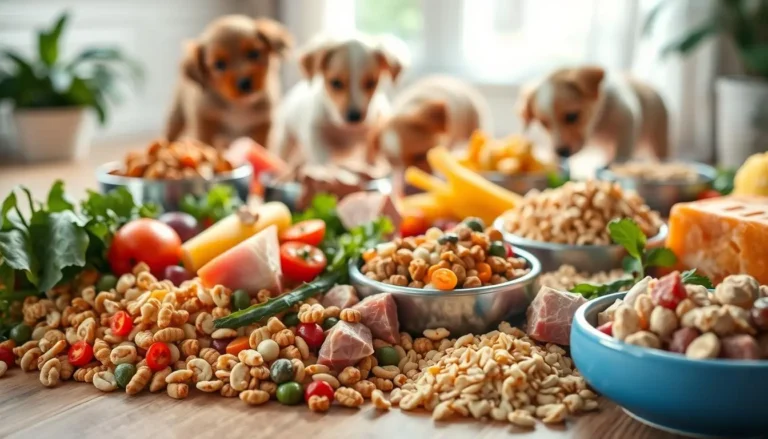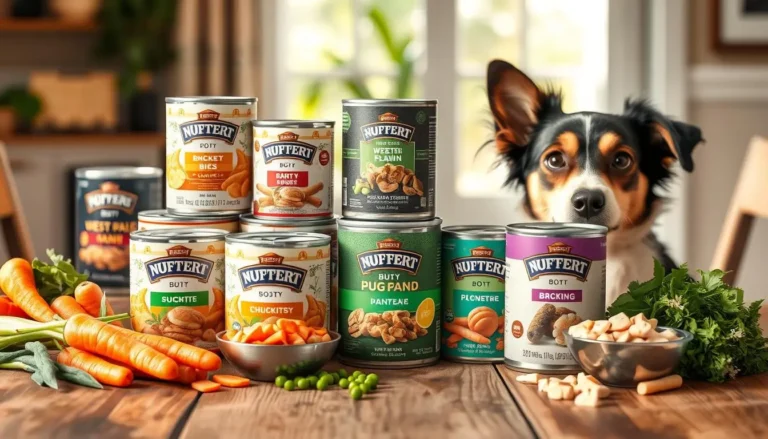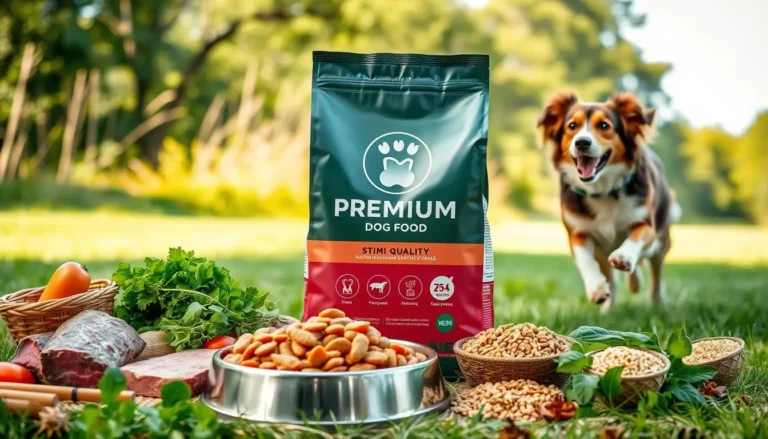Best Puppy Dog Food: Top Picks for Healthy and Happy Growth

Choosing the best puppy dog food is key to their health and growth. The market is full of options, making it hard to pick the best. This guide will help you find the right food for your puppy’s needs.
Puppies need special diets because they grow fast and have lots of energy. The right food helps with bone growth and keeps their immune system strong.
Knowing what your puppy needs can greatly improve their health. We’ll look at top brands, what’s in the food, and expert tips. This will help you choose the best food for your puppy.
Table of Contents
Key Takeaways
- Puppy nutrition differs significantly from adult dog diets
- Protein and fat content are crucial for healthy growth
- Breed size impacts nutritional requirements
- Quality ingredients matter more than quantity
- Regular veterinary consultation helps optimize diet
Understanding Your Puppy’s Nutritional Needs
Choosing the good puppy dog food is key for your furry friend’s health. Puppies need special nutrients for their fast growth and lots of energy. It’s important to pick a diet that supports their development.
Good nutrition is vital for your puppy’s health, bone growth, and immune system. The right puppy food can greatly improve your pet’s health in the long run.
Essential Nutrients for Growing Puppies
Puppies need a balanced diet with certain nutrients for growth. These include:
- High-quality proteins for muscle development
- Calcium and phosphorus for bone growth
- DHA for brain and eye development
- Omega-3 fatty acids for coat and skin health
Caloric Requirements by Age and Size
| Puppy Size | 3-6 Months | 6-12 Months |
|---|---|---|
| Small Breed | 55-100 calories/lb/day | 40-50 calories/lb/day |
| Medium Breed | 45-80 calories/lb/day | 35-45 calories/lb/day |
| Large Breed | 35-55 calories/lb/day | 30-40 calories/lb/day |
The Role of Proteins and Fats
Proteins and fats are the building blocks of your puppy’s growth. Choose puppy food with high-quality animal proteins as the first ingredient. These help with muscle growth, provide energy, and boost the immune system.
“Nutrition is the foundation of your puppy’s health and future well-being.” – Veterinary Nutrition Experts
Remember, every puppy is different. Talk to your vet to find the best nutrition plan for your puppy’s breed and needs.
Best Puppy Dog Food Brands for Different Breeds
Choosing the best puppy dog food is key for your dog’s health. Each breed has special needs for growth and health. Knowing these needs helps pick the best food for your puppy.
When picking the best nutrition, think about your puppy’s size, metabolism, and health risks. Small, medium, and large breeds need different diets.
- Small Breed Puppies: Require higher-calorie, nutrient-dense foods
- Medium Breed Puppies: Need balanced growth formulas
- Large Breed Puppies: Demand controlled calcium and phosphorus levels
Top recommended puppy food brands for breed-specific nutrition include:
| Breed Size | Recommended Brand | Key Nutritional Focus |
|---|---|---|
| Small Breeds | Royal Canin Mini Puppy | High-energy formula |
| Medium Breeds | Hill’s Science Diet Medium Breed Puppy | Balanced growth support |
| Large Breeds | Purina Pro Plan Large Breed Puppy | Joint health optimization |
“Nutrition is the foundation of your puppy’s long-term health and happiness.” – Veterinary Nutrition Experts
Always talk to your vet when choosing puppy food. They can give advice based on your puppy’s health and breed.
Dry vs. Wet Puppy Food: Making the Right Choice
Choosing the best puppy dog food for your puppy can be tough. Your puppy’s diet is key to their growth and health. It’s important to know the differences between dry and wet food.
Choosing the perfect diet for your puppy needs thought. Each food type has its own benefits for your puppy’s health and happiness.
Benefits of Dry Kibble
Good dry puppy food has many advantages:
- Promotes dental health by reducing plaque buildup
- More convenient and easier to store
- Cost-effective compared to wet food
- Typically has a longer shelf life
Advantages of Wet Food
Wet food has special benefits for your puppy’s diet:
- Higher moisture content supports hydration
- Often more palatable for picky eaters
- Can be easier to digest for some puppies
- Provides variety in texture and flavor
Combination Feeding Strategies
Many vets suggest a balanced feeding approach. Here are some strategies for the best nutrition:
| Feeding Method | Pros |
|---|---|
| Dry Kibble Primary Diet | Supports dental health, cost-effective |
| Wet Food Supplement | Adds moisture, increases palatability |
| Balanced Mix | Provides nutritional variety and complete diet |
“The right nutrition can set the foundation for your puppy’s lifelong health and happiness.” – Veterinary Nutrition Experts
Ask your vet for the best feeding plan for your puppy. Consider their breed, size, and health needs.
Natural and Organic Puppy Food Options
Finding the right puppy food can be tough, especially with natural and organic choices. These diets offer special benefits for your puppy’s health and nutrition.
“Quality nutrition starts with understanding what goes into your puppy’s bowl” – Veterinary Nutrition Expert
Natural puppy food means no artificial stuff. It uses whole foods and is processed less. This makes it better for your puppy.
- Organic ingredients certified by USDA
- No artificial preservatives or colors
- Sustainably sourced proteins
- Transparent ingredient sourcing
When picking natural puppy food, look for these things:
| Criteria | What to Look For |
|---|---|
| Protein Source | Free-range chicken, grass-fed beef |
| Ingredient Quality | Whole grains, named meat sources |
| Certification | USDA Organic, Non-GMO Project |
Remember, natural doesn’t always mean nutritionally complete. Always check with your vet to make sure it’s right for your puppy.
Grain-Free vs. Grain-Inclusive Puppy Foods
Choosing the best puppy dog food can be tough for pet owners. The discussion over grain-free versus grain-inclusive diets continues. Veterinarians and dog nutrition experts have different opinions.
Puppies require a tailored diet that evolves with their growth. Good puppy food should help them grow healthy and strong.
Understanding the Grain Debate
The grain-free trend started because of dog allergies and sensitivities. But, not all dogs need a grain-free diet. Whole grains can be very nutritious.
- Some dogs may have grain allergies
- Whole grains provide essential nutrients
- Individual puppy needs vary
When to Choose Grain-Free Options
Grain-free best puppy dog food might be right for dogs with health issues or grain allergies. Always talk to your vet to find the best food for your puppy.
“Not every puppy needs a grain-free diet. Individual nutritional requirements matter most.” – Veterinary Nutrition Expert
Benefits of Whole Grains
Whole grains in puppy food offer many benefits:
- Essential fiber for digestion
- Important minerals and vitamins
- Sustained energy release
Finding a balanced diet is key for your puppy’s health and growth.
Large Breed Puppy Food Considerations
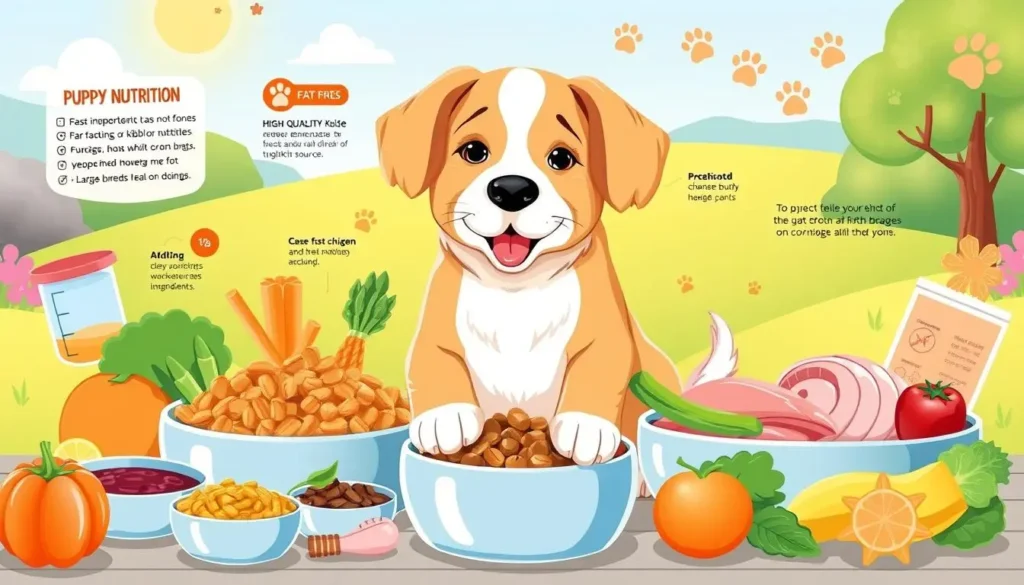
Choosing the right puppy food for large breeds is crucial. These puppies have different needs than smaller ones. They need balanced nutrition for healthy growth and to avoid health issues.
“Ensuring proper nutrition lays the groundwork for your large breed puppy’s lifelong health and well-being.”
Large breed puppies grow fast and face unique challenges. The right food can help manage their growth and prevent joint and bone problems.
- Carefully control calorie intake to prevent rapid weight gain
- Ensure balanced calcium and phosphorus levels
- Focus on joint-supporting nutrients
- Choose foods designed specifically for large breed puppies
Nutritional needs for large breed puppies are vital in the first 18 months. Slow, steady growth is key to preventing skeletal issues.
| Nutritional Focus | Recommended Levels | Purpose |
|---|---|---|
| Protein | 22-24% | Muscle development |
| Calcium | 1.0-1.5% | Bone strength |
| Phosphorus | 0.8-1.2% | Bone mineralization |
When picking puppy food for your large breed, choose specialized formulas. Look for foods that support controlled growth and provide essential nutrients for your puppy.
Small Breed Puppy Nutrition Guide
Caring for a small breed puppy is special. They need their own kind of food. Knowing what they need helps you pick the right food for them.
Small breed puppies eat a lot and fast. They need food that fits their special needs.
Specialized Nutrition Requirements
When picking food for small breed puppies, remember these key points:
- Higher calorie density per kibble
- Smaller kibble size for easy chewing
- Balanced nutrient profile supporting rapid growth
- Enhanced protein and fat content
“Nutrition is the foundation of a healthy, thriving small breed puppy.” – Veterinary Nutrition Expert
Feeding Frequency and Portion Control
Small breed puppies need special feeding to stay healthy. Here’s how to feed them:
- Feed 3-4 small meals daily
- Measure portions precisely
- Avoid overfeeding
- Monitor weight regularly
Choose dog food puppy dog food made for small breeds. It’s best for their health and growth.
Common Ingredients to Avoid in Puppy Food
Choosing the best puppy dog food is key for your puppy’s health. Some ingredients can harm their growth and future health.
- Artificial Preservatives: Chemicals like BHA, BHT, and ethoxyquin can pose health risks
- Unnamed meat by-products that don’t specify the source of protein
- Excessive grain fillers with minimal nutritional value
- Artificial colors and flavor enhancers
- High-fructose corn syrup and sugar additives
“Ingredients in puppy nutrition are not all of the same quality. What you exclude is just as important as what you include.” – Veterinary Nutrition Expert
Low-quality ingredients can cause digestive problems, allergies, and long-term health issues. Look for labels that are clear and use whole foods.
Your puppy’s diet should have high-quality proteins, essential nutrients, and few processed foods. Choose dry puppy food brands that list specific meat sources and use natural preservatives.
Reading and Understanding Puppy Food Labels
Choosing the best puppy dog food for your puppy can be tough. Labels are full of info that might confuse you at first. It’s key to understand these labels to make sure your puppy gets the best nutrition.
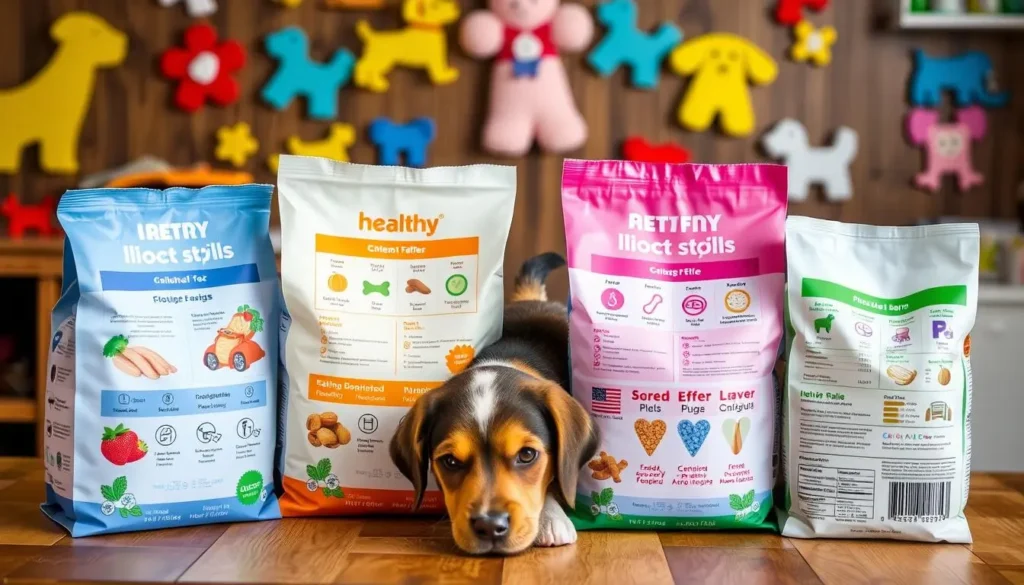
Reading food labels needs careful attention. Not all puppy foods are the same, and the label tells you a lot about what’s in it.
Decoding Ingredient Lists
Here are some important things to remember when looking at ingredient lists:
- Ingredients are listed in order from most to least by weight
- Look for high-quality protein sources at the top
- Avoid foods with many generic meat by-products
Understanding Nutritional Guarantees
Nutritional guarantees give you important info about the food’s makeup. They usually include:
| Nutrient | Puppy Requirements | Ideal Percentage |
|---|---|---|
| Protein | Essential for growth | 22-32% |
| Fat | Energy and development | 10-25% |
| Fiber | Digestive health | 3-5% |
“A carefully read label can make all the difference in your puppy’s nutritional journey.” – Veterinary Nutrition Experts
When picking best puppy dog food for your puppy, check the guaranteed analysis sections. These show the minimum or maximum amounts of important nutrients. This helps you choose the best food for your puppy’s diet.
Transitioning Between Puppy Food Brands
Switching puppy food brands needs careful planning and patience. Your puppy’s digestive system is very sensitive. This makes slow transitions important for their health and to avoid upset.
“A slow and steady approach ensures your puppy adapts to new nutrition smoothly” – Veterinary Nutritionists
Here are the key steps to follow when choosing a new puppy food:
- Start with 75% old food, 25% new food for the first 2-3 days
- Gradually increase new food percentage over 7-10 days
- Monitor your puppy’s appetite and digestive response
- Watch for signs of intolerance like vomiting or diarrhea
Keep an eye on how your puppy reacts during the transition. Good signs include:
- Consistent appetite
- Normal stool consistency
- Maintained energy levels
- No visible discomfort
Pro tip: Always consult your veterinarian before making significant changes to your puppy’s diet.
Remember, every puppy is different. So, the transition might take longer for some. Being patient and watching closely is crucial to find the right puppy food for your furry friend.
Budget-Friendly Quality Puppy Food Options
Feeding your puppy well doesn’t have to cost a lot. You can find good puppy food that’s both affordable and nutritious. It’s all about knowing where to look and how to shop smart.
Puppy nutrition is key, but it can be pricey. Luckily, there are ways to give your puppy great food without spending too much.
Value for Money Choices
Looking for affordable dry puppy food? Here are some good options:
- Purina Pro Plan Focus Puppy
- BLUE Buffalo Life Protection Formula
- Diamond Naturals Puppy Formula
Cost-Saving Feeding Tips
Here are some tips to stretch your puppy food budget:
- Buy larger bags for better price per pound
- Look for manufacturer coupons online
- Compare prices across multiple retailers
- Consider subscription services for discounts
| Brand | Price Range | Nutritional Rating |
|---|---|---|
| Purina Pro Plan | $25-$35 | 4.5/5 |
| BLUE Buffalo | $30-$40 | 4.3/5 |
| Diamond Naturals | $20-$30 | 4.0/5 |
“Quality nutrition doesn’t have to come with a premium price tag.” – Veterinary Nutrition Expert
By being a smart shopper, you can give your puppy high-quality nutrition without overspending. Do your research, compare, and focus on your puppy’s health without worrying about the cost.
Conclusion
Choosing the best puppy dog food is very important for your puppy’s health and happiness. The food they eat affects their growth and well-being. Knowing what your puppy needs and looking at the food’s quality and ingredients helps you make a good choice.
Finding the best puppy food means looking at many things. You’ve learned about breed-specific needs and how to read food labels. Every detail, from grain-free options to ingredient lists, helps make a great diet for your puppy.
As your puppy grows, their diet needs will change. Regular vet visits and watching their weight and energy are important. This ensures they get the best nutrition for a healthy life.
Choosing the right puppy food is an investment in your dog’s future. With what you’ve learned, you can make choices that support your puppy’s growth and health.
FAQ
How often should I feed my puppy?
Puppies need to eat three to four times a day until they’re about 6 months old. After that, you can switch to two meals a day. The right schedule depends on your puppy’s breed, size, and nutritional needs. Always talk to your vet to find the best feeding plan for your puppy.
What key features should I consider in quality puppy food?
Choose the best puppy dog food that offers:
– High-quality protein as the primary ingredient
– Balanced nutrients for healthy growth
– No artificial preservatives or fillers
– Appropriate nutrient levels calories for your puppy’s size
– AAFCO certification
How can I tell if my puppy is receiving proper nutrition?
Watch for signs like steady weight gain, a shiny coat, and lots of energy. Healthy stools and regular vet check-ups also show your puppy is getting enough nutrition.
Can I switch puppy food brands?
Yes, but do it slowly over 7-10 days. Start by mixing a little new food with the old, gradually adding more new food. This helps your puppy adjust without upset stomachs.
Are grain-free foods better for puppies?
Not always. Some puppies do well on grain-free diets, but many need whole grains for nutrients and fiber. Talk to your vet to find the best diet for your puppy.
How much should I feed my puppy?
The amount depends on your puppy’s breed, age, weight, activity level, and the food’s calorie content. Follow the feeding guidelines on the packaging and adjust as your vet recommends. Avoid overfeeding to prevent obesity and health problems.
How does puppy food differ from adult dog food?
Puppy food supports rapid growth with more protein, calories, and nutrients for bones and muscles. It also has smaller kibble and balanced calcium and phosphorus. Adult dog food is for maintenance, not growth.
Can I make homemade puppy food?
Homemade diets can be tricky to balance. Puppies need complex nutrients that are hard to match without professional help. If you want to try homemade food, get advice from a vet nutritionist to ensure your puppy gets all the necessary nutrients.

